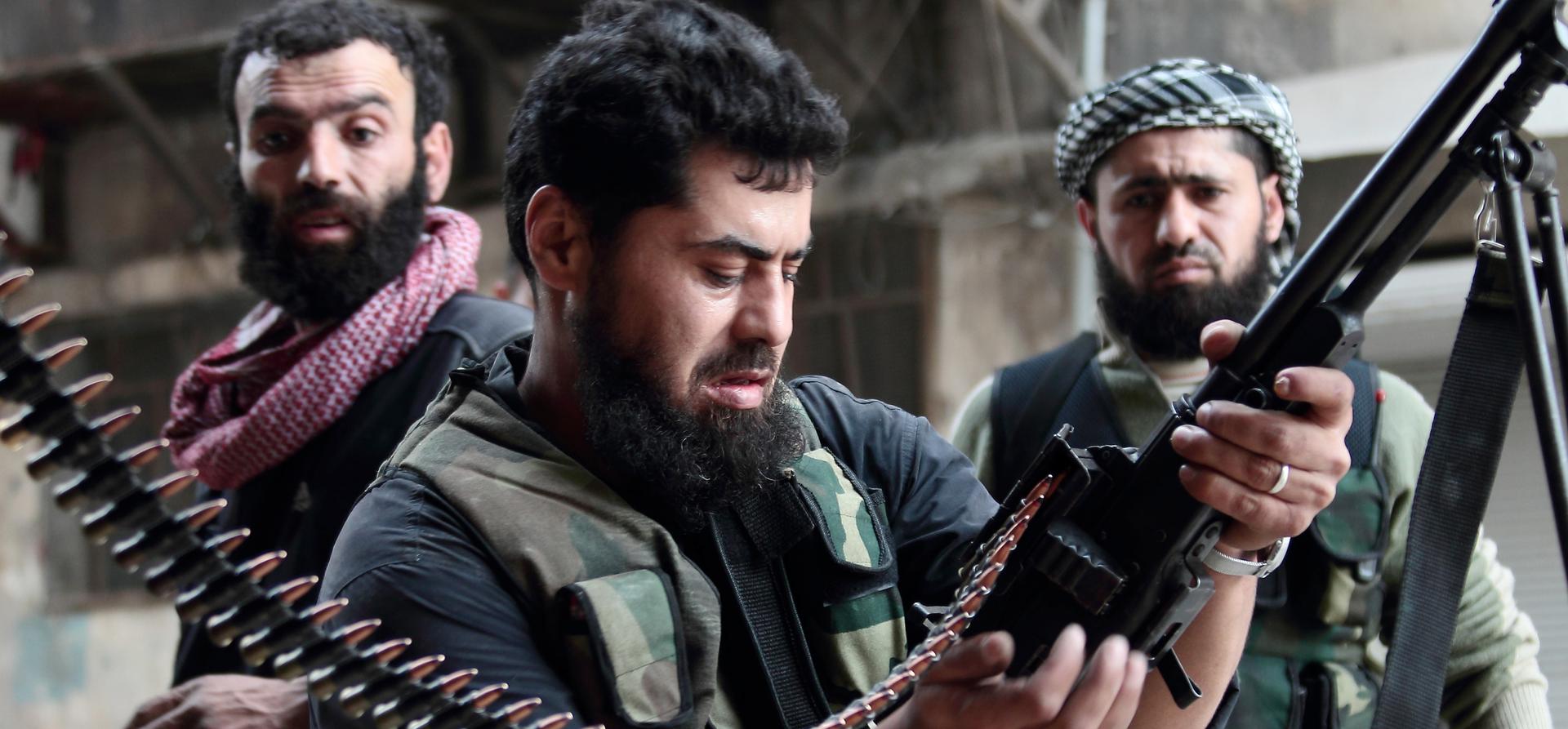Syria’s rebels: Are they losing the war?
A Syrian rebel fighter loads his machine gun during clashes with regime forces.
ISTANBUL, Turkey — After more than two years of bloody civil war in Syria, in which the international community has failed to halt the violence, rebel fighters are skeptical of official US plans to send arms their way.
“They haven’t done anything to help the Syrian people yet and I don’t believe they will now,” Roj Hajuma, a rebel fighter from Syria’s northern Idlib province, said of the Obama Administration’s announcement last Thursday that it would increase “the scope and scale of assistance” to the opposition.
“All they do is talk,” Hajuma said, speaking by phone from Syria. “I don’t believe this will amount to anything.”
The White House move to begin funneling weapons to Syria’s opposition forces comes as the administration says it is confident that the Syrian government has used chemical weapons in the conflict.
It also follows what many Syria observers believe was a crucial victory for government troops — bolstered by Hezbollah militants — in the town of Qusayr near the Lebanese border earlier this month. The town is now back in government control after opposition fighters were routed.
More from GlobalPost: Hezbollah's military prowess gives boost to Syrian troops
The rebels concede they are struggling to hold their ground in some parts of the country, but insist victory is still theirs. It doesn’t matter if the United States provides weapons, they say.
“It is impossible for [Syrian President] Bashar [al-Assad] to win the battle,” said Muhamad Raslan, a fighter with the Syrian Martyr’s Brigade, a rebel unit within the Free Syria Army (FSA) in the northern Idlib province. “We will win, but it will take a long period of time if no one helps us.”
Despite the rhetoric, it has indeed appeared as though the war’s tide is turning against the Syrian opposition in recent weeks, after early rebel victories gave way to a months-long stalemate. Frontlines shifted and tens of thousands of people died, though neither side could claim decisive wins.
More from GlobalPost: Inside Syria: The Battle for Aleppo
In addition to the regime’s recapture of Qusayr this month, government troops launched several successful attacks on rebel positions in both Damascus, the capital, and Aleppo, the country’s largest city, in recent days.
Raslan says fighters from the Lebanese Shiite movement Hezbollah, which threw its weight behind Assad, have played a major role in battling and helping defeat the opposition. Both Syrian rebel fighters and Hezbollah militants say members of the movement have entered villages outside Aleppo, ahead of a reported offensive by Syrian government troops to flush opposition fighters from the city.
FSA fighters entered the city in July last year, prompting a brutal regime crackdown that left neither side in control of the sprawling township. Some observers say if the rebels lose Aleppo, they will almost certainly lose the war.
“This is the first time I even questioned a rebel victory,” said Ali Absi, a university student in the northern Syrian city of Aleppo, said of the more recent opposition loss in Qusayr.
More from GlobalPost: What's the big deal about Qusayr?
“Before, I always believed Bashar would fall. It was just a question of time,” he said of the Syrian president. “But now I am considering the possibility that he could take Syria back.”
Some rebel fighters concede defeat in a handful of the country’s ongoing battles, but they also boast of victories.
Raslan says the opposition has not been weakened, and downplayed the significance of recent government momentum.
He blames Syrian state media for driving the narrative of the government victory at Qusayr, despite the fact that the rebels have in fact retreated.
“The Assad regime uses psychological war all the time,” Raslan said. “If we use logic, the FSA is winning the battle in Syria this month. But the exaggeration of government victories is part of this psychological war, and in fact shows reveals their weakness and fear.”
More from GlobalPost: Inside Syria
But whether or not fresh US military assistance will sustain or prove useful for the rebellion remains unclear.
Some media reports have unnamed US officials saying no weapons systems — like anti-tank or anti-aircraft missiles — will be sent to opposition fighters. Instead, it is likely the US will provide additional small arms like assault rifles and grenades.
One FSA fighter, Bashar Ismael, says it’s the heavy weapons that will make an impact — and that the US military should train Syrian rebels in how to use them.
“They [the US] have not promised anything specific, so there is no obligation to follow through,” Absi said. “At this point, it is just empty words. What Syria needs is a no-fly zone.
“Without it,” he said, “more weapons would simply prolong the fighting.”
Every day, reporters and producers at The World are hard at work bringing you human-centered news from across the globe. But we can’t do it without you. We need your support to ensure we can continue this work for another year.
Make a gift today, and you’ll help us unlock a matching gift of $67,000!
